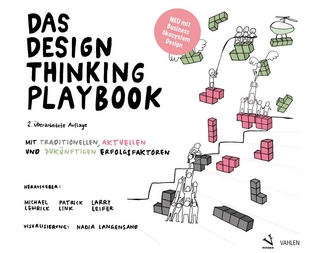
The Oxford Handbook of Cognitive Engineering
Oxford University Press Inc (Verlag)
978-0-19-975718-3 (ISBN)
Cognitive engineering is an interdisciplinary approach to the analysis, modeling, and design of engineered systems or workplaces in which humans and technologies jointly operate to achieve system goals. As individuals, teams, and organizations become increasingly reliant on information technology and automation, it is more important than ever for system and workplace design to be maximally informed by state-of-the-art cognitive engineering research.
This volume is the first authoritative handbook to cover this recent and rapidly growing field. The handbook collects and organizes contemporary cognitive engineering research, drawing on the original research of more than 60 contributing experts. Coverage of human factors, human-computer interaction, and the conceptual foundations of cognitive engineering is extensive, addressing not only cognitive engineering in broader organizations and communities, but also focusing on individual cognition, addressing topics of attention, decision making, and multi-tasking. This thorough approach speaks to the broad scope of cognitive engineering, spanning the individual operator to teams and organizations, with a focus on how systems of people and technology, often in the form of automation, influences performance.
By collecting the best of cognitive engineering research in one volume, this book serves as both a convenient reference guide and as a useful entry point to the large and diverse research literature. As such, this handbook will be a valuable resource for researchers, students, and practitioners in cognitive engineering and a variety of related fields in need of guidance for how to put their products, systems, and services into the hands of human users, performers, and customers.
John D. Lee, Ph.D., is the Emerson Electric professor in the Department of Industrial and Systems Engineering at the University of Wisconsin, Madison and is Director of the Cognitive Systems Laboratory. Alex Kirlik, Ph.D., is a professor in the Departments of Computer Science, Psychology, and Systems Engineering at the University of Illinois at Urbana-Champaign, where he is also member of the Beckman Institute for Advanced Science and Technology.
Part One: Cognitive Engineering: History and Foundations ; Introduction to the Handbook ; John D. Lee and Alex Kirlik ; Part Two: Cognition in Engineered Systems ; 1. The Closed-Loop Dynamics of Cognitive Work ; John M. Flach, Kevin Bennett, Richard J. Jagacinski, Max Mulder, and Rene van Paassen ; 2. Attention ; Christopher Wickens ; 3. Multitasking ; Dario D. Salvucci ; 4. Judgment and Prediction ; Kathleen L. Mosier ; 5. Situation Awareness ; Mica R. Endsley ; 6. Trust, Reliance, and Compliance ; Joachim Meyer and John D. Lee ; 7. Learning and Retention ; Frank E. Ritter, Gordon D. Baxter, Jong W. Kim, and Sowmyalatha Srinivasmurthy ; 8. Expertise ; Walter R. Boot and K. Anders Ericsson ; 9. Neuroergonomics: Brain-inspired Cognitive Engineering ; Raja Parasuraman ; 10. Communication in Socio-Technology Systems ; Daniel G. Morrow and Ute M. Fischer ; 11. Team Cognition: Coordination across Individuals and Machines ; Patricia Bockelman Morrow and Stephen M. Fiore ; 12. Organizational Design and Cognitive Work ; Pascale Carayon and Peter Hoonakker ; Part Three: Cognitive Engineering Methods ; 13. Cognitive Task Analysis ; Beth W. Crandall and Robert R. Hoffman ; 14. Cognitive Work Analysis ; Emilie M. Roth and Ann M. Bisantz ; 15. Decision-Centered Design ; Laura G. Militello and Gary Klein ; 16. Situation Awareness Oriented Design ; Mica R. Endsley ; 17. Cognitive Engineering to Support Successful Aging ; Wendy A. Rogers, Marita A. O'Brien, and Arthur D. Fisk ; 18. Artifact Analysis as a Way to Understand Cognition ; Christopher P. Nemeth and Richard I. Cook ; 19. Evaluation: Does the Cognitive Engineering Effort Do What It Was Envisioned to Do? ; Leonard Adelman ; 20. Microworld Experimentation with Teams ; Nancy J. Cooke and Jamie C. Gorman ; 21. Simulation to Assess Human Responses to Critical Events ; L. Jane Easdown, Arna Banerjee, and Mathew B. Weinger ; 22. Simulation to Assess Safety in Complex Work Environments ; Amy R. Pritchett ; 23. Metrics for Supervisory Control System Evaluation ; M.L. Cummings and Birsen Donmez ; 24. Multi-tasking and Multi-Robot Management ; Michael A. Goodrich ; 25. Human-Machine Cooperation ; Jean-Michel Hoc ; 26. Learning from Failure ; Daniel Hummerdal, Alexander Wilhelmsson, and Sidney Dekker ; Part Four: Cognitive Engineering Models ; 27. Computational Cognitive Modeling of Interactive Performance ; Michael D. Byrne ; 28. Computational Process Modeling and Cognitive Stressors: Background and Prospects for Application in Cognitive Engineering ; Kevin A. Gluck and Glenn Gunzelmann ; 29. Modeling and Formal Analysis of Human-Machine Interaction ; Asaf Degani, Michael Heymann, and Michael Shafto ; 30. Queuing and Network Models ; Yili Liu ; 31. Bayesian and Signal Detection Models ; Jason S. McCarley and Aaron S. Benjamin ; 32. Judgment Analysis ; Alex Kirlik ; 33. Modeling Decision Heuristics ; Konstantinos V. Katsikopoulos and Gerd Gigerenzer ; 34. Establishing the Micro-to-Macro Link in Cognitive Engineering: Multilevel Models of Socio-Computer Interaction ; Wai-Tat Fu and Peter Pirolli ; Part Five: Cognitive Technologies in Engineered Systems ; 35. Configural and Pictorial Displays ; Kevin B. Bennett and John M. Flach ; 36. Emergence in Organizations and Human Collective Intelligence ; Stephen J. Guastello ; 37. Multimodal Displays: Conceptual Basis, Design Guidance, and Research Needs ; Nadine Sarter ; 38. Ecological Interfaces ; Catherine M. Burns ; 39. Uncertainty Visualization and Related Techniques ; Ann M. Bisantz ; 40. Adaptive Automation ; David B. Kaber ; 41. Distributed Communities of Practice ; Anna T. Cianciolo & Karen M. Evans
| Reihe/Serie | Oxford Library of Psychology |
|---|---|
| Verlagsort | New York |
| Sprache | englisch |
| Maße | 254 x 188 mm |
| Gewicht | 1409 g |
| Themenwelt | Geisteswissenschaften ► Psychologie ► Allgemeine Psychologie |
| Geisteswissenschaften ► Psychologie ► Verhaltenstherapie | |
| Informatik ► Software Entwicklung ► User Interfaces (HCI) | |
| Technik | |
| ISBN-10 | 0-19-975718-6 / 0199757186 |
| ISBN-13 | 978-0-19-975718-3 / 9780199757183 |
| Zustand | Neuware |
| Informationen gemäß Produktsicherheitsverordnung (GPSR) | |
| Haben Sie eine Frage zum Produkt? |
aus dem Bereich


